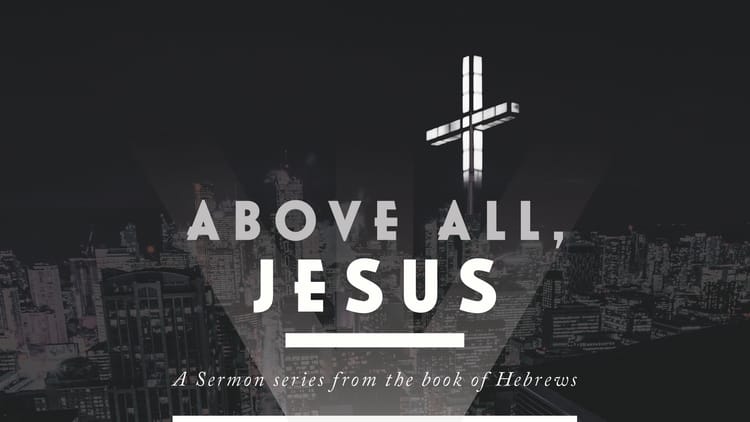The Weak God (Hebrews 4:14-5:10)

There are two ways of living. One of them is to put our best face forward. We all do this to different extents, but some of us live every day behind a mask, afraid to let others see what we’re really like. We have secrets, and we fear that if those secrets were ever discovered, we’d be in trouble.
Some churches encourage this way of living. I’ve been to churches in which everyone presents their best face. The people up front are flawless and airbrushed. You don’t hear a lot about struggles and failures. You see the good side, and if you’ve got problems, you sure don’t talk about them.
There’s another way of living. It’s to bravely take off the mask, to admit that life is messy, and to refuse to pretend. I’ve found that I can relate most powerfully to those who admit that their lives are flawed, that they have weaknesses and hang-ups, that sometimes they’re just hanging on by a thread. There’s freedom in dropping the mask and acknowledging that we’re all roughly in the same spot.
So there are two ways to live, and two types of churches. You can pretend, or you can drop the mask and be real. Christmas is all about being able to drop the mask, to stop pretending, and to know that we can come to God just as we are. That’s one of the amazing facets of the Christmas story.
John 1:14 says, “So the Word became human and lived here on earth among us.” The image that John uses comes from the ancient Scriptures, in which the people dragged a tent around with them in the desert that represented God’s presence. It was called a tabernacle, and it lived in time and place, and it was carted around with them wherever they went. Jesus came and put his feet down on earth, and he lived among us. One of the reasons he did this was so that we could be real with God, knowing that he understands what it’s like to be one of us.
If you’ve got a Bible with you, I want to look at one passage that examines this aspect of Christmas. It’s found in Hebrews 5, and it’s written to Jewish followers of Jesus Christ. Some of the teaching there borrows from the Jewish faith, and it’s a bit of work for us to unpack. But, as you’ll see, it’s well worth the effort.
Jesus the High Priest
In the old Jewish system, a High Priest was the main representative between the people and God. Once a year, on the Day of Atonement, he would take two goats and go through this ritual on behalf of all of the people. One of the goats would be slaughtered and offered to God. The other one would be sent off into the wilderness as a scapegoat – yes, that’s where we get the term. Figuratively, it would be sent out of the community, as if it were bearing the sins of the community. All of this would have been very familiar to those who originally read this passage. The writer of Hebrews describes the requirements of being a High Priest, and then makes his case for why Jesus is the greatest High Priest to have ever lived.
This sounds so academic, until you begin to unpack what some of the requirements are. The writer lists three.
First, a High Priest must be human. You read that and go, “Duh!” I haven’t read many job descriptions lately that start with, “Must be human.” But when you think of this in relation to Jesus, it takes on a new dimension. We celebrate Christmas because Jesus cared enough about representing us to God that he became human, so that he could be one of us. Hebrews 5:1 says, “Every high priest is selected from among men and is appointed to represent them in matters related to God, to offer gifts and sacrifices for sins” (NIV). Jesus doesn’t represent us to God simply as God’s Son. He represents us to God as one of us. On Christmas Day, we remember that God so loved us that he became one of us so he could represent us before God.
God doesn’t have to read a book about what it’s like to be human. He doesn’t have to imagine what it might be like. God knows what it’s like to be human, and he knows what we experience, because on Christmas, God came to live among us. He knows firsthand what it’s like. Because of this, he can represent us to God.
It gets even better. A High Priest must also know what it’s like to be weak. Hebrews 5:2-3 says, “And because he is human, he is able to deal gently with the people, though they are ignorant and wayward. For he is subject to the same weaknesses they have. That is why he has to offer sacrifices, both for their sins and for his own sins.”
A High Priest is compassionate, because he knows what it’s like to be weak. The word weakness in this passage is pretty broad. It could refer to physical weakness, general weakness, or a weakness to sin. Here, it seems to refer to a weakness toward sin. A High Priest is neither lax nor harsh when others sin, because he knows what it’s like. In fact, this is the prayer that a High Priest offered on his own behalf:
Oh God, I have committed iniquity and transgressed and sinned before you. I and my house and the children of Aaron, Your holy people, O God, forgive, I pray, the iniquities and transgressions and sins which I have committed and transgressed and sinned before thee, I and my house.
This amazes me as I think of Jesus. God voluntarily became weak so he could experience what it’s like to be weak. Because he’s experienced it, he isn’t harsh with us when we’re weak either. He’s neither lax nor harsh because he knows exactly what it’s like. When he represents us before God, he does so as one who’s struggled just as we have.
How did Jesus struggle? He was tempted. In fact, you can argue that he was tempted much more than you or I will ever be. I don’t think I’ve ever experienced the full force of temptation because I usually give in before it gets too strong. Jesus resisted temptation and met it head-on, full-force.
Jesus faced the greatest temptation: to turn his back on obedience, to walk away from God in the face of incredible suffering. Not only did he experience the normal weaknesses of being human (fatigue, sickness, discouragement, and hunger), he also experienced the power of temptation. Read what verses 7 to 9 say:
While Jesus was here on earth, he offered prayers and pleadings, with a loud cry and tears, to the one who could deliver him out of death. And God heard his prayers because of his reverence for God. So even though Jesus was God’s Son, he learned obedience from the things he suffered. In this way, God qualified him as a perfect High Priest, and he became the source of eternal salvation for all those who obey him.
“While Jesus was here on earth” is a little too sterile. It literally refers to the days of Jesus’ flesh, emphasizing once again how human he was. He experienced unbearable temptation when he was about to die, so intense that he cried out loudly to God. He was tempted to turn his back on the assignment that God gave him.
Jesus became human when he entered the world, and he didn’t pick up a partial package. He picked up the whole thing. He knows what it’s like to be tempted, to be weak, to feel like giving up. He knows what it’s like to struggle.
The writer lists another requirement for being High Priest. I’ll mention it, but I won’t explore it much today. A High Priest couldn’t just decide to be High Priest. He had to be chosen by God. Hebrews 5:4 says, “And no one can become a high priest simply because he wants such an honor. He has to be called by God for this work, just as Aaron was.” Jesus acts as our High Priest because God has chosen him to do this.
No Pretending
This passage doesn’t seem like a Christmas passage at first, but it really is. One of the reasons that Jesus came to earth and was born as a baby was so that we wouldn’t have to pretend. Instead of imagining what it’s like to be human, or reading a book, he actually became one of us. He is sympathetic to what we go through because he’s been through it himself. He’s even experienced weakness. He knows what it’s like to struggle just like we do.
One of the things that can scare us with God is that he sees and knows everything. That means that he knows us at our best, but he also sees us at our worst. You would imagine that God might be unsympathetic because he’s so not us. How do you tell God what it’s like to be hungry, or to be overtired, or to feel so tempted that you can hardly resist? You tell him because he’s experienced it too. God sees the nakedness of our thoughts, and yet he accepts us. He knows what it’s like. He’s sympathetic because it’s something that Jesus has been through.
I want to turn to the end of chapter 4 as we wrap this up. What difference does it make that Jesus can relate to us? Two things. First, don’t give up. Hebrews 4:14-15 says:
That is why we have a great High Priest who has gone to heaven, Jesus the Son of God. Let us cling to him and never stop trusting him. This High Priest of ours understands our weaknesses, for he faced all of the same temptations we do, yet he did not sin.
We’re all tempted to give up at times. I am. It’s easy to turn our back on everything we know and believe, simply because it’s too tough. Hold firmly, even when you’re ready to give up, because God knows what it’s like to be weak. He’s experienced temptation and weakness just as we are, and he understands.
One more thing: Come to God just as you are. Don’t pretend to be what you’re not. Come as you are. Because Jesus entered this world, and has experienced what it’s like to be one of us, we can come confidently to God for help. We don’t have to pretend. We just have to come. Verse 16 says, “So let us come boldly to the throne of our gracious God. There we will receive his mercy, and we will find grace to help us when we need it.”
We can come as we are to God, and he won’t turn us away because we’re weak. Instead, he promises to give us just what we need – mercy and grace – to help us in our most difficult times.
This is the Christmas message: that we have a God who could have just imagined what it’s like to be human and weak, but instead chose to experience it instead by entering the world and becoming human and weak himself. He invites us to come in our humanity and weakness, just as we are. We don’t need to pretend or to be anything other than what we are.
The past couple of weeks, I’ve had some friends going through some difficult stuff – issues with friends, couples who can’t have children, churches that are blowing apart. There’s part of us that wants to run when we go through this stuff, or to pretend that it doesn’t hurt like it does. God invites us to run, except to him, because he knows what it’s like to be one of us. That’s what we celebrate at Christmas.





